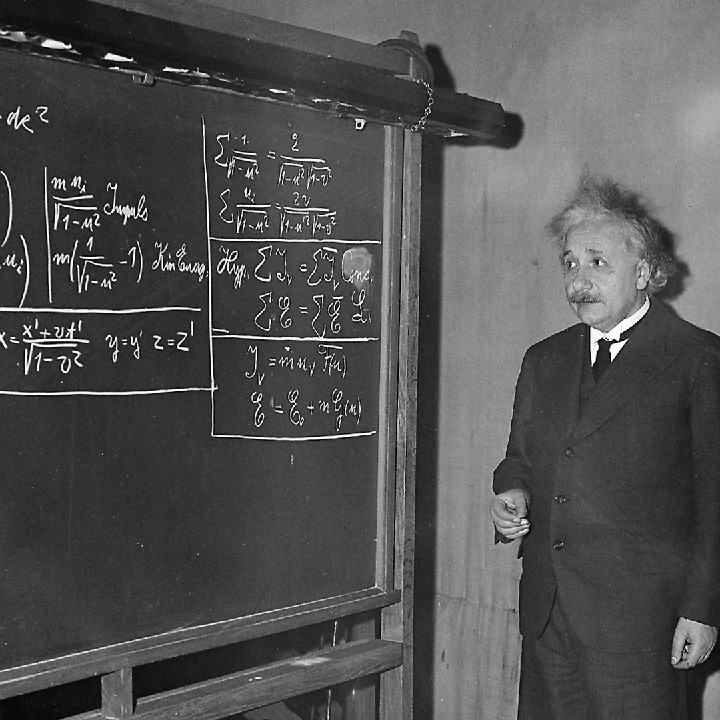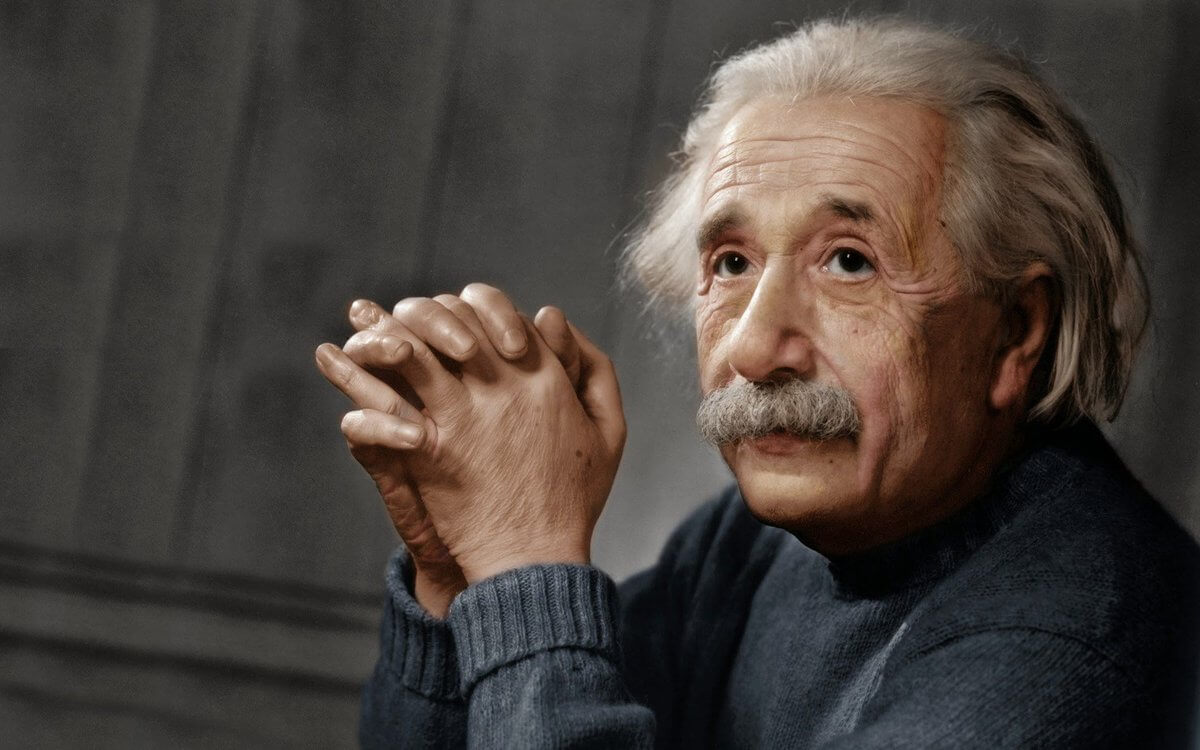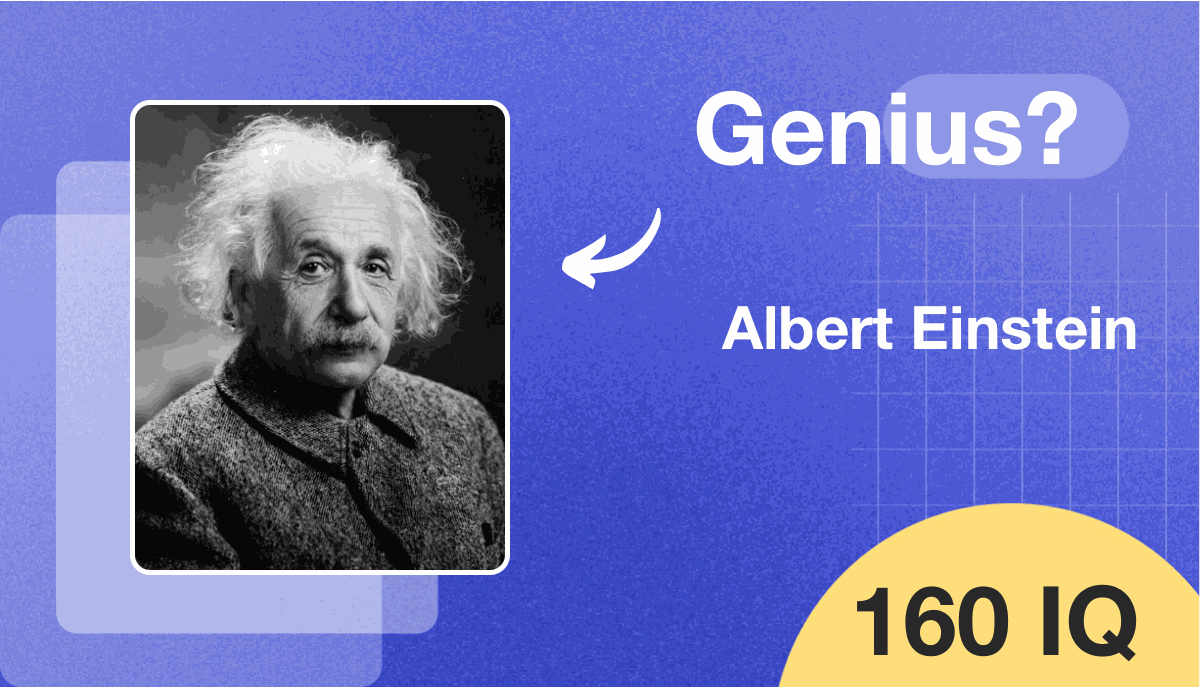What Is Einstein's IQ? The Truth Behind The Genius Estimates
It's a question that pops up a lot when people think about brilliant minds: just what was Albert Einstein's IQ? This particular query, you know, often sparks a lot of curiosity. After all, when we talk about someone whose ideas completely changed our view of the universe, it's natural to wonder about the sheer power of their intellect. People are always eager to grasp how smart he truly was, and what that might look like on a standard scale.
But here's a little twist, actually, that might surprise you: Albert Einstein, the very person whose name is practically a synonym for genius, never actually took a formal IQ test. That's right, there wasn't a proper test designed to measure his intelligence during his lifetime, at least not in the way we think of IQ tests today. So, the definite score remains a bit of a mystery, which is quite interesting, don't you think?
So, what exactly are we talking about when we hear numbers thrown around for his IQ? Well, this article will explore that very puzzle. We'll look at why there's no official record, how experts have gone about estimating his intelligence, and what those estimated numbers really mean in the grand scheme of human brainpower. It's more about understanding the nature of his brilliance rather than just a single number, you see.
Table of Contents
- Who Was Albert Einstein?
- The Big Question: What is Einstein's IQ?
- Why Does Einstein's IQ Matter?
- Frequently Asked Questions About Einstein's IQ
Who Was Albert Einstein?
Before we get into the specifics of his intelligence estimates, it's probably good to remember a little bit about the man himself. Albert Einstein was born in 1879 in Ulm, which was then part of the Kingdom of Württemberg in the German Empire. This man, as a matter of fact, is famously known for his groundbreaking work in physics, which truly reshaped our understanding of space, time, gravity, and energy. His theories, particularly the theory of relativity, were, you know, absolutely revolutionary.
He was a truly remarkable figure, not just for his scientific contributions but also for his humanitarian views and his efforts for peace. He lived through some very turbulent times, and his influence extended far beyond the scientific community. His life story, too, is a testament to perseverance and independent thought, which is pretty inspiring, actually.
Personal Details
| Detail | Information |
|---|---|
| Full Name | Albert Einstein |
| Born | March 14, 1879 |
| Birthplace | Ulm, Kingdom of Württemberg, German Empire |
| Died | April 18, 1955 (aged 76) |
| Nationality | German (by birth), Swiss, American |
| Known For | Theory of Relativity, E=mc², Photoelectric Effect |
| Awards | Nobel Prize in Physics (1921) |
The Big Question: What is Einstein's IQ?
So, we come back to the core question that brought us here: what exactly was Albert Einstein's IQ? It's a very common thing to wonder, especially when someone's achievements are so vast and impactful. However, the answer, as we've hinted at, isn't as straightforward as you might hope. It's not like there's a file somewhere with a definitive score, which is, you know, a bit of a shame for those who love clear numbers.
The Truth About IQ Tests and Einstein
The plain truth is, nobody really can say for sure what Einstein's IQ was because he never actually took an IQ test. There’s no indication, apparently, that he ever was tested. This is a pretty important point to grasp, as it shapes all the discussions around his intelligence score. IQ testing was still in its very early stages, you see, in the early 1900s when he was truly emerging as a scientific luminary. It wasn't a common practice, nor was it as standardized or widespread as it became much later. So, we can only rely on estimates, which is, well, just how it is.
Because he never took any kind of formal test to measure his intelligence, the definite score is still a mystery. This means that any number you hear regarding his IQ is, at best, an educated guess, or rather, a postulation by experts looking back at his life and work. It's not based on him sitting down with a pencil and paper and answering a series of questions, like, you know, we might do today.
How Experts Estimate Einstein's Intelligence
Despite the lack of a formal test, experts have, in a way, taken it upon themselves to analyze his IQ. These estimations are largely derived from his truly astonishing achievements in physics. For example, in 1905, a year often called his "Annus Mirabilis" or "Miracle Year," Einstein published four groundbreaking papers that laid many of the foundations for modern physics. This was, frankly, an incredible feat for anyone, let alone someone so young. These accomplishments are a huge part of why people try to put a number on his intelligence.
According to some sources, Einstein’s IQ was probably about 160, which is commonly considered genius level. This number, you see, is largely derived from his achievements, as mentioned. Based on historical records and biographical data, Albert Einstein’s IQ has been estimated to sit anywhere between 160 and 180. Some experts, too, have even postulated his IQ was approximately between 160 and 190, which lies within the typical range for such estimates. And then, there are even those who say his IQ was reportedly slightly over 200. It's a wide range, isn't it?
These estimations are not just pulled out of thin air; they are based on careful analysis of his intellectual output, his problem-solving abilities, his capacity for abstract thought, and his sheer originality. IQ, after all, represents overall cognitive abilities, and his work certainly demonstrated an exceptionally high level of these. It's like, you know, looking at a magnificent building and trying to guess the strength of the foundation.
What Do the Numbers Mean?
So, if we consider these estimated numbers, what do they actually tell us? On the normed scale where 100 IQ represents average intelligence (adjusted for age), Einstein’s estimated 160 score places him in the 99.9th percentile of human brainpower. That would firmly place the physicist in the genius territory, without a doubt. Albert Einstein’s IQ number is estimated to be around 160, which is well above the average IQ and places him firmly in the genius rank. This is a very significant figure, honestly.
To put it in perspective, on average, the typical person can score somewhere between 85 and 110. Anything above 130 is considered a high IQ, and a score under 70 is often considered a low IQ. A score of 135 or above, you know, puts a person in the 99th percentile of the population. So, an estimated 160 is truly exceptional. It means he's in the top 1% of the global population, which is pretty incredible, really.
It's worth noting, too, that while Einstein's estimated IQ is incredibly high, it's not the highest ever recorded. For instance, in 1986, Marilyn vos Savant gained widespread fame when she entered the Guinness World Record category for the “highest IQ,” with her IQ recorded at 228, a record she held until 1989. This just goes to show that while Einstein's intellect was phenomenal, the concept of "highest IQ" is, you know, a different discussion entirely.
Why Does Einstein's IQ Matter?
You might ask, why do we even care about an estimated IQ score for someone like Einstein, especially since it's not a verified number? Well, it's not just about the number itself, but rather what it represents. His estimated IQ serves as a kind of shorthand for the extraordinary cognitive abilities that allowed him to revolutionize physics. It helps us, in a way, to grasp the sheer scale of his intellectual contributions.
His work, like the special theory of relativity or his explanations of the photoelectric effect, didn't just tweak existing ideas; they fundamentally changed them. This kind of original thought and deep insight, you know, requires a mind capable of seeing connections and patterns that others simply miss. The IQ estimate, then, is a way of acknowledging that profound capability. It's a recognition of the kind of brainpower that can conceptualize something as abstract as space-time curvature.
Moreover, discussing his estimated IQ often sparks broader conversations about intelligence itself. What makes someone a genius? Is it just a high score on a test, or is it creativity, persistence, and the ability to challenge conventional wisdom? Einstein's legacy, in fact, suggests it's a combination of many things, with a powerful intellect certainly being a core component. Learn more about intelligence on our site, and link to this page about human cognition.
It also reminds us that true genius isn't always about formal schooling or traditional measures. Einstein, for example, had his own struggles with the academic system early on, yet his mind was clearly working on a different level. This makes his story, you know, all the more compelling for many people who might not fit neatly into conventional boxes.
Ultimately, the fascination with Albert Einstein's IQ isn't just about a number; it's about trying to understand the mind behind some of the most profound scientific discoveries in history. It's about appreciating the kind of thinking that can literally change the world, which is, well, pretty amazing, isn't it? For more general information about Albert Einstein, you might find this Wikipedia page quite useful.
Frequently Asked Questions About Einstein's IQ
Did Albert Einstein ever take an IQ test?
No, Albert Einstein never actually took a formal IQ test. There's no verified record that he ever did, you know, and IQ testing was still very much in its early stages during his most productive years. So, any number you hear is an estimate, not an actual score from a test he took, which is a pretty important distinction, actually.
What is considered a genius IQ score?
Generally speaking, an IQ score above 130 is considered very high, often placing someone in the "gifted" or "highly intelligent" category. For a score to be considered "genius level," it typically falls into the range of 140 or higher. Albert Einstein's estimated IQ of around 160 firmly places him in that genius rank, you see, which is quite impressive.
How is IQ measured?
IQ, which stands for Intelligence Quotient, is measured through standardized tests designed to assess various cognitive abilities, like reasoning, problem-solving, memory, and verbal comprehension. These tests are normed so that the average score is 100. However, for historical figures like Einstein, whose intelligence was never formally tested, experts rely on analyzing their achievements, writings, and biographical data to make, you know, an educated estimation of their cognitive capabilities.

Einstein Iq

Unraveling The Genius: Understanding Albert Einstein's IQ

Understanding Einstein IQ: What It Means and How to Apply It – Dong Ciskin